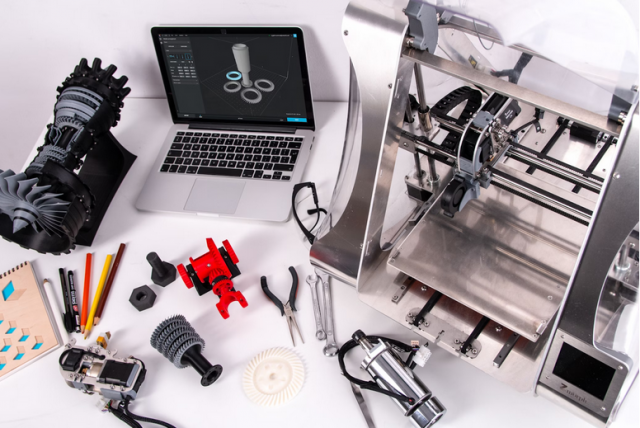In the dynamic world of manufacturing, the interplay of economic fluctuations and technological advancements creates a unique landscape. Despite facing economic headwinds and a dip in orders for manufacturing technology, as highlighted by the U.S. Manufacturing Technology Orders Report, which indicates a 13.5% decline in orders totaling $4.05 billion through October 2023 compared to the same period in 2022, the manufacturing sector continues to evolve and adapt.
This resilience is largely attributed to the sector’s increasing embrace of cutting-edge technologies. These advancements are not just a response to immediate challenges; they represent a strategic reorientation toward greater efficiency, innovation, and adaptability.
As we explore the top five technological solutions reshaping production and manufacturing, it’s important to consider how these innovations are setting new standards in an industry characterized by continuous change and adaptability.
Metal Rapid Prototyping
A standout in the realm of manufacturing technologies is metal rapid prototyping. This process, vital for the modern manufacturer, involves the quick fabrication of metal parts using 3D CAD data. Its significance lies in its ability to speed up the product development process, allowing designers and engineers to test and refine their metal components swiftly.
With metal rapid prototyping, iterations that once took weeks can now be completed in a matter of days, enabling a faster turnaround from concept to final product. This technology not only enhances design precision but also offers a tangible feel of the product early in the design process, leading to improved end products and a more efficient design cycle.
Automated Assembly Lines
The advancement of assembly lines through the introduction of automation marks a significant milestone in the evolution of manufacturing technology. By incorporating robotics and sophisticated software systems, these automated lines have completely transformed the traditional concept of mass production.
Unlike their manual predecessors, these automated systems boast the capability to function continuously, 24/7, drastically enhancing production speeds. They also maintain, or even elevate, the quality of the products being produced. The remarkable adaptability of these systems is a key feature, as they can be efficiently reconfigured to handle a variety of products.
This flexibility, when coupled with a notable reduction in human errors, solidifies automated assembly lines as a fundamental component in modern manufacturing, ensuring higher productivity, consistency, and reliability in production processes.
Advanced Quality Control Using AI
Artificial intelligence (AI) has emerged as a pivotal force in the realm of quality control within the manufacturing sector. Leveraging sophisticated algorithms, AI systems are adept at conducting thorough analyses of products, detecting any defects or inconsistencies with remarkable accuracy.
This ensures that only products meeting the highest quality standards make their way to the market. This meticulous precision is particularly critical in sectors where quality is of utmost importance, such as the automotive and aerospace industries. The deployment of AI in quality control not only upholds a consistent standard of excellence but also plays a significant role in reducing the financial implications associated with product waste and recalls.
Moreover, the inherent nature of AI systems to continuously learn and evolve over time results in the progressive enhancement of quality control processes. This ongoing advancement signifies a transformative impact on manufacturing, leading to smarter, more efficient, and cost-effective quality assurance practices.
IoT for Enhanced Operational Efficiency
The Internet of Things (IoT) is transforming manufacturing operations by enabling a level of connectivity and data analysis previously unattainable. IoT devices, embedded within manufacturing equipment and along supply chains, gather and transmit real-time data. This information is invaluable for monitoring production processes, optimizing operations, and even predicting maintenance needs before breakdowns occur.
The predictive maintenance capability of IoT technology minimizes downtime and extends the life of machinery, contributing to a more efficient production line. Additionally, IoT’s role in supply chain management ensures a smoother, more responsive flow of materials, further enhancing operational efficiency.
3D Printing for Customized Production
3D printing, also known as additive manufacturing, is reshaping the landscape of customized production. This technology enables the creation of complex, customized parts with a level of speed and efficiency that traditional manufacturing methods cannot match. 3D printing’s ability to produce parts on demand reduces the need for large inventories, thereby lowering storage costs and minimizing waste.
Particularly advantageous for industries requiring bespoke components, 3D printing offers a solution that is both flexible and cost-effective. The technology’s continuous advancements promise an even greater role in the future of manufacturing, potentially revolutionizing how we think about production and design.
Final Thoughts
The impact of these technological solutions on the manufacturing sector is profound. Manufacturers adopting advanced technologies are elevating their output and redefining benchmarks in quality and innovation.
With the ongoing evolution of these technologies, they are poised to unlock new opportunities and drive the manufacturing sector toward a future marked by heightened efficiency and accuracy. The journey of technological advancement in manufacturing is ongoing, and its potential remains boundless.








